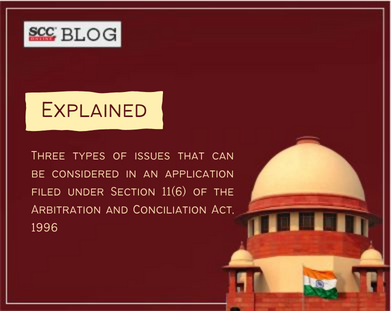Supreme Court: In an appeal against the judgment passed by Telangana High Court, wherein the High Court dismissed the application filed by the appellant under Section 11(6) of the Arbitration and Conciliation Act, 1996 (‘Act of 1996’), the division bench of B.R Gavai and B.V. Nagarathna*, JJ. held that the High Court was not right in dismissing the petition under Section 11(6) of the Act of 1996 filed by the appellant by giving a finding on novation of the share purchase agreement between the parties, as the said aspect would have a bearing on the merits of the controversy between the parties. Therefore, it must be left to the Arbitrator to decide on the said issue also. Hence, sets aside the impugned judgment passed by the High Court.
The point for consideration was whether the judgment of the High Court calls for any interference or modification by the Supreme Court?
The plea taken by the respondent was that, owing to novation of share purchase agreement, the arbitration clause no longer existed so as to resolve the dispute between the parties through arbitration.
Per Contra, the plea of the appellant is that there was no such novation of the share purchase agreement, and the arbitration clause was very much available and hence, the High Court ought to have referred the matter to arbitration.
The Court referred to National Insurance Co. Ltd. v. Boghara Polyfab (P) Ltd., (2009) 1 SCC 267, wherein the Court has identified and segregated the issues that could be considered in an application filed under Section 11(6) of the Act of 1996 into three categories.
The Court said that the Chief Justice or his designate is bound to decide the issues in the first category; the issues falling under the second category are raised in an application under Section 11 of the Arbitration Act, the Chief Justice or his designate may decide them or may leave it open with a direction to the Arbitral Tribunal to decide the same. But if the Chief Justice or his designate chooses to examine the issue and decides it, the Arbitral Tribunal cannot re-examine the same issue. As far as the issues which arise in the third category are concerned, they must be dealt with exclusively by the Arbitral Tribunal, such as excepted or excluded matters. It would also include the merits of any claim involved in arbitration.
The Court also took note of Vidya Drolia v. Durga Trading Corpn., (2019) 20 SCC 406, wherein it was observed that the first category of issues, namely, whether the party has approached the appropriate High Court, whether there is an arbitration agreement, and whether the party who has applied for reference is party to such agreement, would be subject to a more thorough examination in comparison to the second and third issues which are presumptively, save in exceptional cases, for the arbitrator to decide.
Thus, the Court said that the Court at the referral stage can interfere only when it is manifest that the claims are ex facie time barred and dead, or there is no subsisting dispute. Further, in the context of the issue of the limitation period, in case of disputed “no claim certificate” or defence on the plea of novation and “accord and satisfaction” it should be referred to the Arbitral Tribunal for a decision on merits.
Further, the Court referred to Damodar Valley Corpn. v. K.K. Kar, (1974) 1 SCC 141 and said that even if the performance of the contract has come to an end, the contract can still be in existence for certain purposes in respect of disputes arising under it or in connection with it.
Thus, the Court held that the High Court was not right in dismissing the petition under Section 11(6) of the Act of 1996 filed by the appellant.
[Meenakshi Solar Power (P) Ltd. v. Abhyudaya Green Economic Zones (P) Ltd., 2022 SCC OnLine SC 1616, decided on 23-11-2022]
*Judgment by: Justice BV Nagarathna.
*Apoorva Goel, Editorial Assistant has reported this brief.






